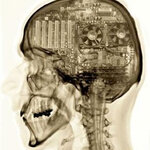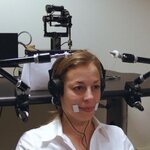
Is it possible to share a pain that you observe in another but have never actually experienced yourself? A new study uses brain-imaging to try and answer this question and the research, published in Neuron, may provide insight into the brain mechanisms involved in empathy.
Brain-imaging studies have shown similar patterns of brain activity when subjects feel their own emotions or observe the same emotions in others. It has been suggested that a person who has never experienced a specific feeling would have a difficult time directly empathizing with a person through a "mirror…



